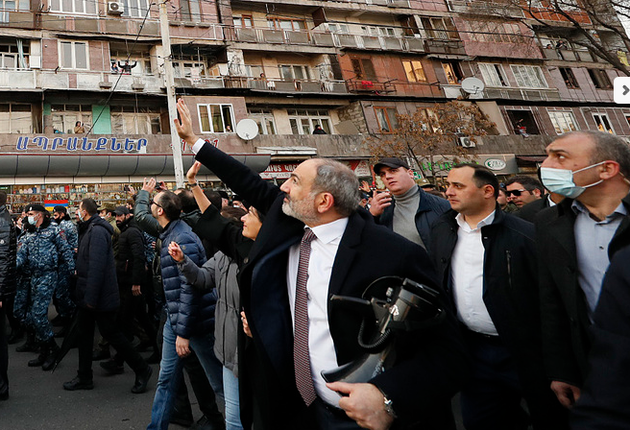Fortunately, the first serious attempt of the armed forces has had no major consequences for now. However, this endeavor shows that the power grip can easily slide away from Pashinyan’s grasp despite all the popular support he has, Turan Gafarlı, Bachelor of Arts in History and Politics from Queen Mary University of London and a Master of Arts in Transnational Studies from University College London, writes for Anadolu Agency.
Nikol Pashinyan, a former journalist and marginal figure of the opposition, became the leader of Armenia after the “velvet revolution” of 2018. Apart from his pro-Western and “pro-peace” image, his profile indeed mattered because his two predecessors were prominent members of the “Karabakh clan” who had a direct involvement in the war crimes committed against Azerbaijani civilians during the war in the early 1990s. As a result, many hoped that Pashinyan would be a man of peace and finally turn the page of war and help resolve the Nagorno-Karabakh conflict.
However, Pashinyan’s so-called “peaceful” rhetoric died down a year after coming to power. His messages became more aggressive vis-à-vis Azerbaijan and his speeches in the occupied territories fueled more tensions. The violations of the ceasefire in his tenure led to the attempted Armenian attack on Tovuz last summer. The latter failed but the continued provocations by the Armenian side increased the risk of war exponentially. The implications of these provocations prompted the Azerbaijani army to launch a counteroffensive, which resulted in a full-scale war between the two countries. The ensuing 44-day war became a disaster for Armenia and its prime minister, as Azerbaijan liberated much of its occupied land and exposed the vulnerability of the Armenian armed forces. The war came to an end thanks to the trilateral agreement signed in November.
The military command’s tacit support was one of the main elements that helped Pashinyan to hold on to power after the 44-day war. When the furious mob stormed the parliament and attacked the personal quarters of the prime minister, the armed forces and police chose to protect the status quo. Nevertheless, the military institution had some unaddressed grievances pertaining to the war. As a result, the military command issued a statement demanding the prime minister’s resignation right after Pashinyan’s dismissal of Tiran Khachatryan, the second highest-ranking official in the armed forces.
The primary reason for Khachatryan’s dismissal is connected to the scandal of the unusable Russian weaponry during the Nagorno-Karabakh war. Armenian forces used Russian-made Iskander missiles to target Azerbaijani civilian centers. However, most of the missiles failed to hit their targets. Notwithstanding the war crime per se, Khachatryan defended the efficiency of the missiles, thereby publicly contradicting the prime minister. The jury is still out to determine whether the general acted as the mouthpiece of Moscow . One thing is clear, though: the general’s statement caused his dismissal and created greater frictions between the military and the government. The military leadership stood in defense of Khachatryan and criticized the government’s foreign policy, objecting to the army being targeted as a scapegoat after the war. While Chief of the Armed Forces Onik Gasparyan was dismissed by the prime minister, the Armenian president still did not sanction the two dismissals despite Khachatryan’s comments, adding to the confusion.
The military’s involvement in the civilian administration is a threat to the democratic process in Armenia. Even though Pashinyan has made mistakes during his term, he remains an elected leader with widespread popular support, as he recently proved, once again, by walking in the streets of Yerevan and gathering his supporters for a rally.
Russia’s official position on the attempted coup is interesting. The Kremlin described the event as an internal affair. Turkey was one of the first countries to condemn the failed coup against the elected government. Likewise, Azerbaijan expressed its concern about any unpredictable change in Armenia, as the November agreement’s integrity is a priority for the preservation of peace. The prospect of a new leader in Armenia supported by a pro-Russian military head may well reignite the conflict. Therefore, Azerbaijani President Ilham Aliyev warned Armenia against “revanchist thinking” and stated that the war had ended.
Washington has once again prioritized its pro-democratic interests and expressed support for a civilian administration in Yerevan. The anti-Russian stance of the new Biden administration could be decisive in determining Pashinyan’s fate. After the latest coup attempt, Armenia’s prime minister is faced with a tough decision: either siding totally with Moscow or getting closer to the West. Considering the Russian military base in Armenia, the Russian troops in Karabakh and increasing domestic instability, the price of any split with Moscow could be fatal.
The situation in Armenia remains unstable and will most probably lead to a new election rather than a civil war. Fortunately, the first serious attempt of the armed forces has had no major consequences for now. However, this endeavor shows that the power grip can easily slide away from Pashinyan’s grasp despite all the popular support he has.






